工商管理专业英语Unit_2
- 格式:ppt
- 大小:502.50 KB
- 文档页数:11
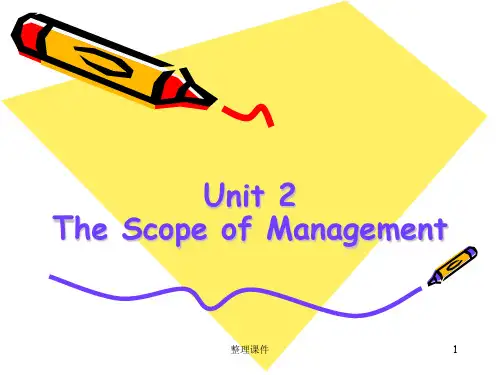

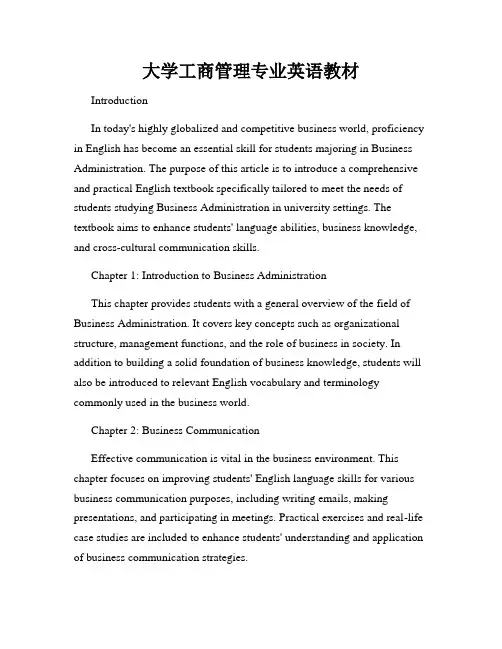
大学工商管理专业英语教材IntroductionIn today's highly globalized and competitive business world, proficiency in English has become an essential skill for students majoring in Business Administration. The purpose of this article is to introduce a comprehensive and practical English textbook specifically tailored to meet the needs of students studying Business Administration in university settings. The textbook aims to enhance students' language abilities, business knowledge, and cross-cultural communication skills.Chapter 1: Introduction to Business AdministrationThis chapter provides students with a general overview of the field of Business Administration. It covers key concepts such as organizational structure, management functions, and the role of business in society. In addition to building a solid foundation of business knowledge, students will also be introduced to relevant English vocabulary and terminology commonly used in the business world.Chapter 2: Business CommunicationEffective communication is vital in the business environment. This chapter focuses on improving students' English language skills for various business communication purposes, including writing emails, making presentations, and participating in meetings. Practical exercises and real-life case studies are included to enhance students' understanding and application of business communication strategies.Chapter 3: Marketing and AdvertisingMarketing plays a crucial role in any business's success. This chapter explores marketing principles and strategies, including market research, segmentation, branding, and advertising. Students will learn to analyze marketing campaigns and develop English language proficiency in presenting marketing plans and strategies effectively.Chapter 4: International BusinessIn the increasingly interconnected global marketplace, understanding international business practices is essential. This chapter introduces concepts related to international trade, global economics, cultural diversity, and managing multinational enterprises. Students will develop language skillsfor negotiating, collaborating, and conducting business across different cultures and markets.Chapter 5: Financial ManagementFinancial management is a fundamental aspect of business administration. This chapter covers key topics including financial statements, budgeting, investment strategies, and risk management. Students will practice using English to analyze financial data, discuss financial performance, and make informed business decisions.Chapter 6: Human Resource ManagementThe success of any organization heavily relies on effective management of its human resources. Students will learn about recruitment processes, employee training and development, performance evaluation, and employee motivation. The chapter helps students develop English language skills inareas such as conducting job interviews, delivering employee feedback, and resolving conflicts in the workplace.Chapter 7: Business Ethics and Corporate Social ResponsibilityIn today's society, businesses are expected to operate ethically and sustainably. This chapter explores the importance of business ethics and corporate social responsibility. Students will engage in discussions and debates, improving their English language proficiency while considering ethical dilemmas and the impact of business decisions on society.Chapter 8: Entrepreneurship and InnovationEntrepreneurship and innovation are crucial drivers of economic growth and societal advancement. This chapter introduces students to the world of entrepreneurship, including business planning, opportunity recognition, and managing a startup. Students will enhance their English language skills by developing business pitches, presenting innovative ideas, and analyzing successful entrepreneurial ventures.ConclusionThis English textbook for students majoring in Business Administration provides comprehensive coverage of key topics in the field. By integrating language learning with business knowledge, students will develop the necessary skills to excel in today's dynamic and competitive business environment. This textbook aims to empower students with effective communication abilities, cross-cultural competencies, and a solid foundation in business principles.。
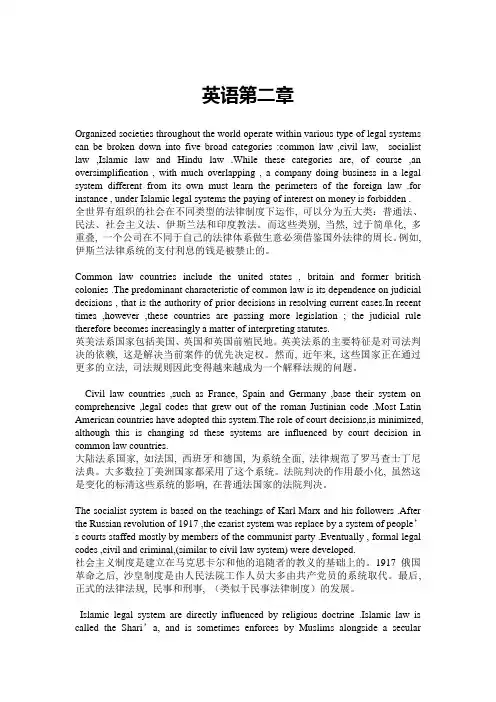
英语第二章Organized societies throughout the world operate within various type of legal systems can be broken down into five broad categories :common law ,civil law, socialist law ,Islamic law and Hindu law .While these categories are, of course ,an oversimplification , with much overlapping , a company doing business in a legal system different from its own must learn the perimeters of the foreign law .for instance , under Islamic legal systems the paying of interest on money is forbidden .全世界有组织的社会在不同类型的法律制度下运作, 可以分为五大类:普通法、民法、社会主义法、伊斯兰法和印度教法。
而这些类别, 当然, 过于简单化, 多重叠, 一个公司在不同于自己的法律体系做生意必须借鉴国外法律的周长。
例如, 伊斯兰法律系统的支付利息的钱是被禁止的。
Common law countries include the united states , britain and former british colonies .The predominant characteristic of common law is its dependence on judicial decisions , that is the authority of prior decisions in resolving current cases.In recent times ,however ,these countries are passing more legislation ; the judicial rule therefore becomes increasingly a matter of interpreting statutes.英美法系国家包括美国、英国和英国前殖民地。
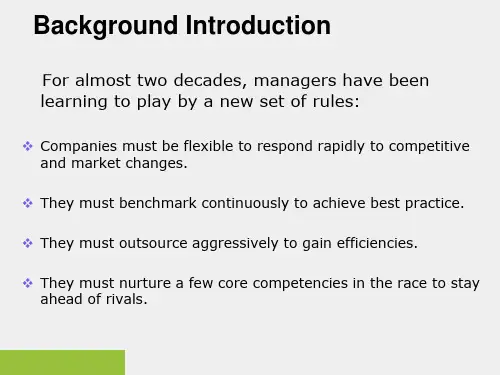




管理学专业英语教程第二版unit2答案1、You needn’t _______ me. I’m old enough to take care of myself. [单选题] *A. worry about(正确答案)B. write downC. put awayD. wake up2、The Spring Festival is on the way.Many shops have _______ huge posters with the word sales. [单选题] *A. put up(正确答案)B. put onC. put outD. put off3、I passed the test, I _____ it without your help. [单选题] *A.would not passB. wouldn't have passed(正确答案)C. didn't passD.had not passed4、Many volunteers _______ food and water to the local people in Japan after tsunami(海啸). [单选题] *A. gave out(正确答案)B. cut outC. put outD. found out5、There are many_____desks in the room. [单选题] *rge old brown(正确答案)B.old large brownrge brown oldD.brown old large6、The children ______ visiting the museum. [单选题] *A. look overB. look forward to(正确答案)C. look forD. look after7、John suggest _____ anything about it until they found out more facts. [单选题] *A not to sayB. not sayC to say notD not saying(正确答案)8、She’s _______ with her present _______ job. [单选题] *A. boring; boringB. bored; boredC. boring; boredD. bored; boring(正确答案)9、Why don’t you _______ the bad habit of smoking. [单选题] *A. apply forB. get rid of(正确答案)C. work asD. graduate from10、The scenery is so beautiful. Let’s _______. [单选题] *A. take photos(正确答案)B. take mapsC. take busD. take exams11、I used to take ____ long way to take the bus that went by ____ tunnel under the water. [单选题] *A. a, aB. a. theC. a, /(正确答案)D. the, a12、--How is your friend coming?--I’m not sure. He _______ drive here. [单选题] *A. may(正确答案)B. canC. mustD. will13、I always get ______ grades than he does, so maybe I should help him more.()[单选题] *A. bestB. better(正确答案)C. goodD. well14、Sitting at the back of the room()a very shy girl with two bright eyes. [单选题] *A. is(正确答案)B. areC. hasD. there was15、Alice is fond of playing ____ piano while Henry is interested in listening to ___ music. [单选题] *A. the, /(正确答案)B. the, theC. the, aD. /, the16、(), it would be much more sensible to do it later instead of finishing it now. [单选题] *A. FinallyB. MildlyC. Actually(正确答案)D. Successfully17、Sometimes Americans are said to be _____. [单选题] *A superficially friendB superficial friendC. superficial friendlyD. superficially friendly(正确答案)18、These two films are very interesting. I like them _____. [单选题] *A. eitherB. neitherC. allD. both(正确答案)19、35.___________ good music the teacher is playing! [单选题] *A.What(正确答案)B.HowC.What aD.What the20、Customers see location as the first factor when_____a decision about buying a house. [单选题] *A.makeB.to makeC.making(正确答案)D.made21、—Why do you look so ______?—Our team won the basketball match!()[单选题] *A. angryB. excited(正确答案)C. nervousD. unfair22、( ) The Great Wall was listed by the UNESCO as ___ World Heritage Site. [单选题]*A. a(正确答案)B. theC.\D.an23、Since we have _____ money left,we can't afford the expensive computer. [单选题] *A. a littleB. a fewC. little(正确答案)D. few24、9.—Will there be more cars in the future?—________. [单选题] *A.See youB.Well, I'm not sure(正确答案)C.You're welcomeD.Thank you25、______ pocket money did you get when you were a child? ()[单选题] *A. WhatB. HowC. How manyD. How much(正确答案)26、I’m still unable to make myself_____in the discussion, which worries me a lot. [单选题]*A.understandB.understood(正确答案)C.understandingD.to be understood27、You have coughed for several days, Bill. Stop smoking, _______ you’ll get better soon. [单选题] *A. butB. afterC. orD. and(正确答案)28、I hope to see you again _______. [单选题] *A. long long agoB. long beforeC. before long(正确答案)D. long29、You could hardly imagine _______ amazing the Great Wall was. [单选题] *A. how(正确答案)B. whatC. whyD. where30、Stephanie _______ going shopping to staying at home. [单选题] *A. prefers(正确答案)B. likesC. preferD. instead。
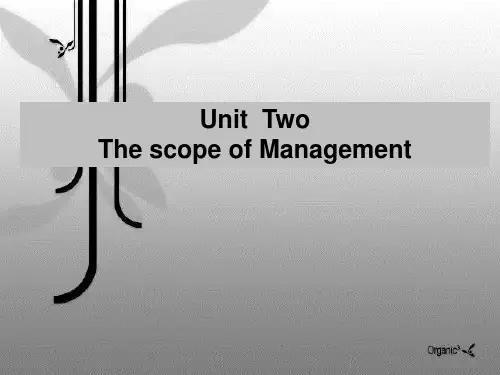
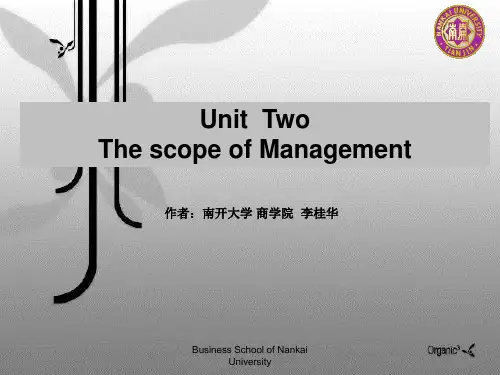
大学工商管理英语教材IntroductionIn today's globalized world, English plays a crucial role in various fields, including business management. As a result, universities have developed specialized textbooks to cater to the needs of students studying business administration. This article aims to explore the characteristics and essential components of a comprehensive university-level business management English textbook.Chapter 1: Introduction to Business ManagementThis chapter provides an overview of the principles and concepts of business management. It covers topics such as the functions of management, different management theories, and the importance of effective communication within an organization. Additionally, it includes case studies and real-life examples to illustrate these concepts.Chapter 2: Organizational Behavior and LeadershipThis chapter delves into the study of human behavior within organizations and explores various leadership styles. It covers topics such as motivation, group dynamics, and the role of leadership in achieving organizational success. The chapter also emphasizes the importance of ethical behavior and decision-making in business management.Chapter 3: Marketing ManagementIn this chapter, students learn about the fundamentals of marketing management. It includes topics such as market research, segmenting andtargeting the market, developing marketing strategies, and analyzing consumer behavior. Practical exercises and case studies are provided to enhance students' understanding and application of marketing concepts.Chapter 4: Financial ManagementFinancial management is a crucial aspect of business administration. This chapter introduces students to the basics of financial management, including financial statement analysis, budgeting, and capital investment decisions. It also addresses the importance of financial planning and forecasting for sustainable business growth.Chapter 5: Human Resource ManagementThis chapter focuses on the management of human resources within organizations. It covers topics such as recruitment and selection, training and development, performance appraisal, and employee relations. The chapter also highlights the significance of effective human resource management in building a motivated and productive workforce.Chapter 6: Operations ManagementOperations management is essential for efficient production and service delivery. This chapter explores concepts such as production planning, supply chain management, quality control, and process improvement. Students are encouraged to think critically and apply these concepts to real-world business scenarios.Chapter 7: International BusinessIn today's interconnected world, international business plays a crucial role in the global economy. This chapter provides an overview of international trade, global market entry strategies, cultural considerations, and the challenges of managing multinational corporations. It also discusses the importance of cross-cultural communication and understanding in international business scenarios.Chapter 8: Entrepreneurship and Small Business ManagementEntrepreneurship is the driving force behind innovation and economic development. This chapter introduces students to the fundamentals of entrepreneurship, including opportunity identification, business planning, and risk management. It also emphasizes the unique challenges and opportunities associated with managing small businesses.ConclusionA comprehensive university-level business management English textbook should cover various aspects of business administration, including principles of management, marketing, finance, human resources, operations, international business, and entrepreneurship. By incorporating case studies, real-life examples, and practical exercises, such a textbook can provide students with the necessary knowledge and skills to excel in the field of business management.。
Unit1二、填词翻译Contingent dynamic conflict compromise interdependent reliance popularity sufficient insights generalize memoirs classic management science behavioral integrate sole1、The managers described their own experiences and tried to (generalize) the principles they believed could be applied in similar situations.管理人员描述了自己的经历和试图推广的原则,他们认为可以应用在类似的情况下。
2、Even today ,a great deal of what we know about management comes from the autobiographies and (memoirs)of men and women who are or have been practicing managers.甚至在今天, 我们所了解的管理学也都出自于那些管理人员的自传和论文集。
3、According to the text ,the three well-established approaches to management thought are the (classical) approach ,which focuses on the task of managing work and organizations ;the (behavioral) approach ,which focuses on the task of managing people;and the (management science)approach,which focus on the task of production and operations.根据本文,管理思想中有三个行之有效的方法,分别是古典方法、行为方法和管理学科学方法,其中古典方法专注于管理工作和组织的任务,行为方法专注于管理人的任务,管理学科学方法专注于生产和运营的任务。
工商管理英语二English:As a student majoring in Business Administration, I understand the importance of developing strong communication skills in both English and Chinese. Being able to effectively communicate in English is especially crucial in the global business environment, where many multinational companies use English as the primary language. In addition to mastering technical business and management knowledge, I also aim to enhance my language proficiency through various methods such as attending language exchange events, reading English literature, and practicing speaking with native speakers. By continuously improving my language skills, I believe I can better adapt to the diverse and dynamic business landscape and ultimately achieve success in my career.中文翻译:作为一名主修工商管理的学生,我深知在英语和汉语双语沟通的重要性。
在全球化的商业环境中,能够有效地使用英语沟通尤为关键,许多跨国公司都以英语作为主要语言。
英语第二章, . , , , a a , .全世界有组织的社会在不同类型的法律制度下运作,可以分为五大类:普通法、民法、社会主义法、伊斯兰法和印度教法。
而这些类别,当然,过于简单化,多重叠,一个公司在不同于自己的法律体系做生意必须借鉴国外法律的周长。
例如,伊斯兰法律系统的支付利息的钱是被禁止的。
, . , . ; a .英美法系国家包括美国、英国和英国前殖民地。
英美法系的主要特征是对司法判决的依赖,这是解决当前案件的优先决定权。
然而,近年来,这些国家正在通过更多的立法,司法规则因此变得越来越成为一个解释法规的问题。
, . . , .大陆法系国家,如法国,西班牙和德国,为系统全面,法律规范了罗马查士丁尼法典。
大多数拉丁美洲国家都采用了这个系统。
法院判决的作用最小化,虽然这是变化的标清这些系统的影响,在普通法国家的法院判决。
. 1917 a ’s . , ,( ) .社会主义制度是建立在马克思卡尔和他的追随者的教义的基础上的。
1917俄国革命之后,沙皇制度是由人民法院工作人员大多由共产党员的系统取代。
最后,正式的法律法规,民事和刑事,(类似于民事法律制度)的发展。
. ’a, a . . .伊斯兰法律制度直接受宗教教义的影响。
伊斯兰法是所谓的伊斯兰教法,有时是执行由穆斯林与世俗化。
当它是主要的法律制度,所有公民都必须服从它,不管他们是否是穆斯林。
对违规行为的惩罚是很快,有时也会受到西方标准的严厉的处罚。
1950 .印度法突出主要在印度,它存在于世俗的法律源于英国的普通法。
它主要涉及家庭和财产继承。
1950年印度从英国独立后,印度法律在这方面的规定。
. . a .这是无法回答的问题,这些法律制度,在最好的。
我们中的大多数人都倾向于在我们国家和文化中使用的系统。
然而,一个成熟的社会的证据,是它愿意质疑和批判自己的系统和尝试的变化和改进,当可能。
:美国的大法律,可以根据几个分类系统进行分段:. ( ). . a a , ( ) . , a .公法与私法。